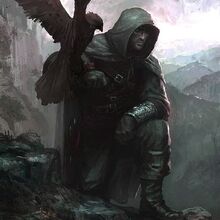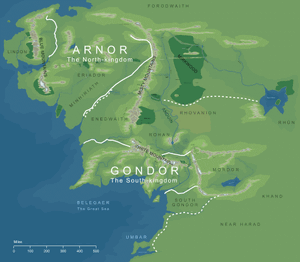The Dúnedain (singular: Dúnadan) were Men descended from the Númenóreans who survived the fall of their island kingdom (Númenor) and migrated to Eriador in Middle-earth, led at first by Elendil and his sons. They were known as the Men of the West and the Men of Westernesse (direct translations of the Sindarin term). They settled mainly in Arnor and Gondor, but during the Third Age only in the Gondor-region.
History

Depiction of a Dunedain ranger from Tales of the Cards.com
The term Dúnedain designated the "Edain of the West", the Númenoreans, although the term came out of use amongst the King´s Men and came to denote especially the descendants of the Elendili, the Númenorean Colonists in Arnor and Gondor or Dúnedain of the North and Dúnedain of the South.
The Noble Families of high-blood continued to consider themselves Dúnedain while they denominated the mixed-blooded common people as "lesser Dúnedain" or Tergil (Haeranedain in Rhudaur).
After the fall of Arnor and then Arthedain, some of the northern Dúnedain became the Rangers of the North in Evendim. The surviving Dúnedain population of Arnor retreated to the Angle south of Rivendell. In the meantime the southern Dúnedain intermarried more and more with so-called Middle Men, except in some regions (such as Dol Amroth).

The kingdoms of the Dúnedain in Middle-earth
During and even before the War of the Ring, Dúnedain Rangers went through a variety of different duties. Some were stationed around the Shire, protecting it from the forces of darkness. Others simply patrolled the northern lands, hunting and defeating any enemies they found. In general, Dúnedain Rangers mainly took care of themselves and of lands of the Free Peoples, though if they were called upon to battle (by Gondor or some other land in need) they were quite willing to do so.
Rangers used a variety of weapons to achieve victory in battles. Non-canonical information hints that they preferred bows and archery as their primary weapons, though this is not always the case (Aragorn, for example, used a sword). They also used swords to engage in close combat if necessary. The Dúnedain mainly rely on stealth as an advantage rather than an actual face-to-face confrontation. It is also hinted that their battle skill was greater than that of a standard Gondorian soldier or archer.
In the Fourth Age, the Dúnedain of Gondor and Arnor were reunited under king Aragorn II Elessar (who was also called the Dúnadan).

Dunedain at the city of Fornost, in The Battle for Middle-earth II
Characteristics
Direct descendants of the Dúnedain are known to live longer than normal Men. A good example is Aragorn who, in the movies, tells Éowyn he is 87 years old, although he appears to be relatively young. (It is said that Dunedain live three times longer than normal Men; that would translate to appx. 150-180 years of average lifespan, given normal human lifespan of 50-60 years (Life span similar to that of the Middle-Ages, not that of modern times). It is possible with the blood of the Dúnedain renewed by Aragorn and Arwen's marriage that some generations thereafter would experience lifetimes similar to that of the generations following Elros - between 400 and 500 years of life--however, Aragorn did have the longest uninterrupted reign of all his descendants.
Etymology
The Westron name for Dúnadan was simply Adûn, "westerner", but this name was seldom used. This name was reserved to those Númenóreans who were friendly to the Elves:
Tergil (Sgl."Targil" Q."Tarkil") or Torfiriath were the descendants of Dúnedain who had intermarried with other peoples (usually middle-men). They were also known as Lesser Dúnedain. Most Gondorians and many Eriadorians .
Known Dúnedain
|
The People of Middle-earth
Men:
Edain | Dúnedain | Númenóreans | Haradrim | Easterlings | Variags | Northmen | Dunlendings | Drúedain | Forodwaith (Lossoth) Vanyar | Ñoldor | Teleri | Sindar | Nandor | Avari Durin's Folk | Firebeards | Broadbeams | Ironfists | Blacklocks | Stonefoots | Stiffbeards |
